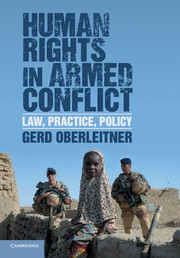Book contents
- Frontmatter
- Contents
- Acknowledgments
- Table of cases
- Table of Legal Instruments
- List of Abbreviations
- Introduction
- Part I Human rights in armed conflict: history of an idea
- Part II Human rights and humanitarian law: theory
- Part III Human rights and humanitarian law: challenges and commonalities
- Part IV The dynamics of war and law
- 13 The changing character of war
- 14 Governing internal armed violence
- 15 Human rights in situations of occupation
- 16 Context: the humanization of international law
- Part V Enforcement: practice and potential
- Conclusion
- Bibliography
- Index
- References
16 - Context: the humanization of international law
Published online by Cambridge University Press: 05 March 2015
- Frontmatter
- Contents
- Acknowledgments
- Table of cases
- Table of Legal Instruments
- List of Abbreviations
- Introduction
- Part I Human rights in armed conflict: history of an idea
- Part II Human rights and humanitarian law: theory
- Part III Human rights and humanitarian law: challenges and commonalities
- Part IV The dynamics of war and law
- 13 The changing character of war
- 14 Governing internal armed violence
- 15 Human rights in situations of occupation
- 16 Context: the humanization of international law
- Part V Enforcement: practice and potential
- Conclusion
- Bibliography
- Index
- References
Summary
Humanity in international law
The debate on human rights in armed conflict reflects broader trends in international law and policy beyond concerns for the existing and future jus in bello. In particular, it represents and, at the same time, decisively fuels and contributes to three interlinked developments in international law which may be termed individualization, humanization and constitutionalization. Together, they describe the possible transformation of international law from a set of rudimentary inter-state agreements which regulate the coexistence and cooperation of sovereign nation states towards a normative framework which increasingly accommodates the human being as the ultimate beneficiary of any law. These intertwined processes are geared towards a legal order which protects and empowers individual human beings in a “humanitarian” way in the broadest sense, accommodates basic norms for inter- and intra-state behaviour in a constitutionalist sense, and provides for human rather than national security as a constituent concern of international law. While these trends are clearly discernible, they remain disputed as well as important for the debate on human rights in armed conflict.
The idea that international law is on such a trajectory of humanization means bringing community interests as well as the individual human being into the centre of law-making at the expense of the unquestioned and absolute sovereignty of states. It invites a reflection on whether the development of international law is driven more by the will of states or occurs on the basis of shared values of the international community and human conscience, and how the two approaches go together. In such a perspective and in light of the debate on the law of war, “humanity” transcends its meaning as merciful human kindness exchanged between individual persons and becomes a Grundnorm of an otherwise still state-based system. While such a growing universalization of norms is obviously likely to be praised by cosmopolitans and fits into a constructivist worldview, it will create less enthusiasm in the realist quarter, particularly when it comes to matters of war and peace.
- Type
- Chapter
- Information
- Human Rights in Armed ConflictLaw, Practice, Policy, pp. 232 - 238Publisher: Cambridge University PressPrint publication year: 2015



